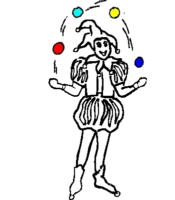My performance career began with the art of magic—a craft built on knowing something the audience doesn’t. Magic, in its essence, is about secrets. But sometimes, even the magician is left surprised. I share now an incident that not only shaped my career but deepened my view of magic performance, because I was open to discovering—and pursuing—the very secrets that were hidden not just from my audience, but from me as well.
I was 15 years old when my interest in magic went from a casual hobby to a passion. At that age, I was already performing on NYC subways, street corners, and anywhere I could gather an audience. With each show, I honed my skills, learning new tricks, refining my sleight of hand, and growing in confidence. But one day, during a visit to my grandfather’s house in Atlantic City, I learned that even the best magician can be fooled.
I told him about the performances I’d been doing in Central Park, but when I mentioned how I’d mastered some new tricks, his reaction wasn’t what I expected. He looked at me with surprise and skepticism. “You’re not fooling me,” he said, certain that no trick could deceive him. In his eyes, I was still the same kid, and no matter how skilled I thought I was, he believed he was too sharp to be tricked.
Determined to prove myself, I pulled out a deck of cards. “That must be a trick deck,” he said immediately. Without missing a beat, I replied, “I’ll happily work with any deck you provide.” He walked out of the room, only to return moments later with a fresh, sealed deck of cards. It was the first time I would use that particular deck, and in front of him, with my sleeves rolled up to show I wasn’t hiding anything, I broke the seal and shuffled the cards in plain sight.
As I laid out my story of the cards’ magical properties, I felt confident. These cards, I explained, had the ability to change and adapt to the magician’s needs. To demonstrate, I lifted the top card and displayed it: “Oh, a joker,” I said. “It wouldn’t be right for me to use such a special card. There are two identical jokers in the deck. Let’s place this one aside and use the one below it.” I followed my words with action and placed the first joker face down to the side, drawing the next card.
I looked at the second card: another joker. “Well, at least we can get rid of them at once,” I said, placing this one aside too. When I drew the third card, I was genuinely surprised to see yet another joker. “That’s strange,” I muttered, as my grandfather’s expression shifted from disbelief to intrigue. With each successive card, more jokers appeared. The fourth, the fifth, the sixth, I continued, as his surprise turned into awe. At this point, I had amassed a pile of jokers that was far larger than any magician’s sleight of hand should reasonably allow.
But the secret I held was not in the tricks I’d spent years learning and perfecting. No, the real secret was the deck itself—a deck my grandfather had bought for card games, one that was anything but ordinary. Unknown to him, this particular deck was filled with jokers; not just the usual two. I stumbled upon this hidden truth purely by accident.
I continued the trick, convincing my grandfather that I deserved credit for the miracle unfolding before his eyes. But the reality was much simpler: it wasn’t my skill that made the trick so unbelievable; it was the unexpected nature of the deck itself.
Eventually, fearing that my streak of luck might end, I paused and asked, “Do you need to see more, or are you convinced that you can be fooled?”
“Just one more,” he said, his curiosity piqued. I hesitated, trying to convince him that he had already seen enough. “It’s getting repetitive,” I argued, but he pressed me. “If you’re really good, show me one more.” Reluctantly, I agreed. I drew yet another card—a joker. He urged me to continue. I hesitated again, now genuinely worried that the next card wouldn’t follow the pattern. Unfortunately, I felt I had no choice but to comply.
Each card revealed a joker. And when my grandfather was convinced that I could continue forever, he finally said, “You win.”
With a smile, I asked, “Can I keep the deck?” He laughed and agreed, saying, “You’ve earned it.” I quickly tucked it into my pocket before he could inspect it further, eager to get away before my lucky break was exposed.
It wasn’t until later that evening, when I pulled the cards from the box, that I counted—37 jokers in a pack of 54 cards. The sealed deck he’d given me, purchased for ordinary card games, had turned out to be a miracle of its own.
What I’ve learned from this experience, and from my journey as a magician and storyteller, is this: the best magic isn’t just about the tricks we perform—it’s about the surprises that come when we least expect them. The true magic happens when both the magician and the audience are caught off guard, when the puzzle is more complex than it appears. And sometimes, the real secret is the one we stumble upon by accident.
For years, my grandfather told stories of the incredible miracle I performed with his deck of cards. But the real secret wasn’t in the trick—it was in the joy of discovery, and in the fact that, for both of us, each in our own way, the puzzle remained unsolved.
